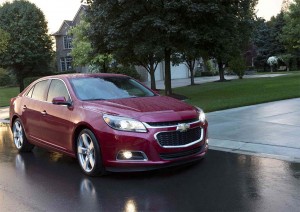Ignition switch and airbag problems have been responsible for some of the biggest recalls of the past year – and they’re now being blamed for a pair of new recalls at General Motors.
In both cases, however, the problems are different from those that have led to earlier big recalls. But one of the two new announcements suggests that Japanese supplier Takata’s problems could be growing worse.
The new ignition switch problem, however, may have been caught early, in large part due to a new safety program GM has set up in-house to catch potential safety issues.
The automaker last month paid a $900 million fine to settle a criminal probe by the U.S. Justice Department triggered by the revelation GM had delayed for a decade a recall now linked to more than 100 fatalities.
(GM expanding US diesel plans despite VW scandal. Click Here for more.)
That earlier ignition switch problem was the result of a defect that could cause the switches to be jostled into the Off or Accessory positions, shutting the vehicle off. If that happened, power brakes and steering would be disabled, as well as a vehicle’s airbag system.
The automaker ultimately recalled 2.5 million vehicles – and fired 19 employees who did not take action to correct the problem when it was first uncovered. It also set up a victim’s compensation program that determined more than 100 were killed in crashes caused by the defect. GM still is facing legal action linked to the original ignition switch problem.
The new issue was identified through the “Speak Up for Safety” program the maker set up last year as part of an effort to improve its handling of safety issues. In contrast to the original problem, a small number of GM pickups and SUVs have an ignition switch that wasn’t built to specification. Their keys can get stuck in Start if the vehicle interior is hot. Later, they can slip into the Accessory position if the cabin cools or the key is jostled.
All told, GM is recalling 3,300 vehicles, including some 2014 Chevrolet Silverado and GMC Sierra pickups and 2015 Chevy Suburban and Tahoe SUVs.
(Kia just the latest maker to face “rollaway car” problems. Click Here for more.)
The second recall involves more than 400 GM cars and SUVs, including a small number of 2015 Chevrolet Equinox, Malibu and Camaro models as well as the Buick LaCrosse, Cadillac XTS and GMC Terrain. The recall will require repairs to the vehicles’ side impact airbag inflators.
GM advised the National Highway Traffic Safety Administration earlier this month that an air bag inflator exploded with too much force during testing by embattled supplier Takata earlier this month. GM subsequently required a recall was needed covering about 414 vehicles.
Defects with Takata airbags have so far led to the recall of 19.2 million vehicles sold by 11 manufacturers in the U.S. NHTSA has advised seven other companies they could face recalls with the Takata airbags they are using, as well.
Until recently, the focus of the Takata problem was centered around older vehicles and only front driver and passenger airbag systems. But the focus of an ongoing investigation broadened over the summer following reports that a side-impact airbag in a 2015 Volkswagen Tiguan had inflated improperly, sending shrapnel spraying into the passenger compartment and causing a serious injury to the driver. GM then reported side airbag problems with about 330 vehicles being shipped abroad.
NHTSA has not yet decided whether a broader recall of newer Takata systems will be needed, but the odds of that happening increase with each report of trouble, observers warn.
The exact cause of the Takata problems is unclear. It was originally linked to a manufacturing problem at two North American plants, and was believed to be worsened when vehicles were used in areas of high humidity, such as South Florida. But some skeptics, such as Clarence Ditlow, head of the Center for Automotive Safety, contend the problem is linked to the chemistry used by Takata in its inflators, explosive ammonium nitrate.
(VW accused of under-reporting safety problems. Click Here for details.)



I have been puzzled by why all of these airbag problems, with almost all manufacturers, is linked to one Japanese company. Why on earth isn’t there an American company doing this? Why is this company still in business? When are our car manufactures going to wise up & buy American? All of this mess & the size & expense of all this is just hard to believe. Come on GM, Ford, Chrysler, etc., WAKE UP!
The challenge is that the consolidation of the supplier base has led to a decline in alternatives for parts such as airbag inflators. The cost of entering this business is huge and I don’t see a new US player to rival Takata.
Paul A. Eisenstein
Publisher, TheDetroitBureau.com